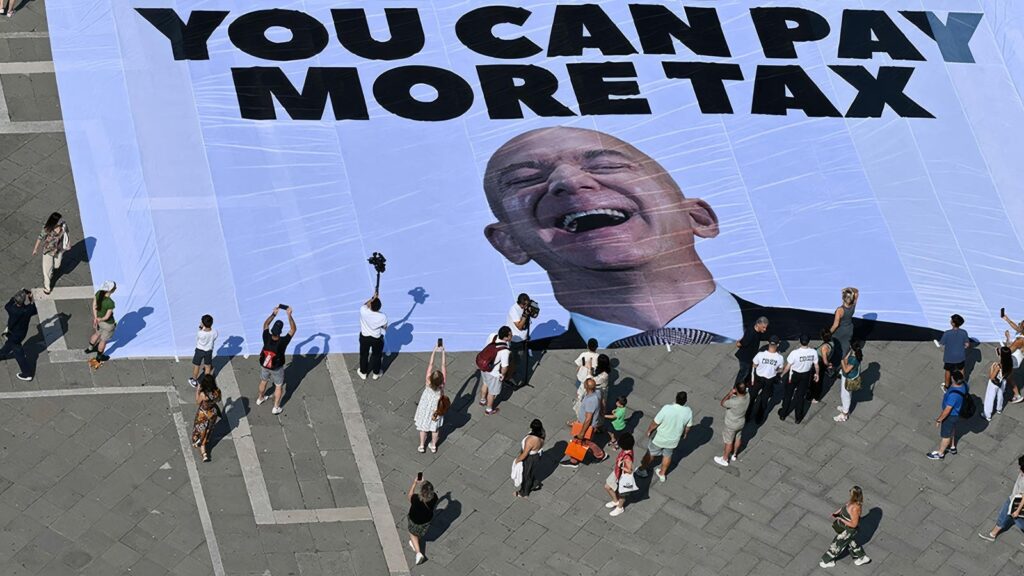Protestors Demand Wealthy Billionaires, Including Jeff Bezos, Pay Their Fair Share in Taxes
Activists from the UK-based group "Everyone Hates Elon" and Greenpeace Italy recently made headlines by unfurling a striking 4,300-square-foot banner in Venice’s Piazza San Marco, calling on billionaire Jeff Bezos to contribute more in taxes before his wedding with former TV journalist Lauren Sánchez. The message read, "If you can rent Venice for your wedding, you can pay more tax.” This event isn’t merely a protest against one individual; it’s a rallying cry for systemic change to ensure that billionaires are held accountable for their tax obligations.
The Tax Landscape for Billionaires Like Jeff Bezos
Clara Thompson, a campaigner from Greenpeace, emphasized that the real fight lies in addressing a flawed system that permits the ultra-wealthy to evade their fair share of taxes. But how much tax does Bezos really pay?
- Estimated Tax Payment: According to Forbes estimates, Bezos is anticipated to pay approximately $2.7 billion in taxes for the year 2024.
- Stock Sales: A large portion of this tax comes from Bezos’s record year of selling Amazon shares, wherein he liquidated $13.6 billion worth as Amazon’s stock price surged by 46%, elevating his net worth to an astonishing $231 billion.
Despite these figures, Bezos’s tax payments become a point of contention. Last year, his taxes represented merely 4.5% of his wealth increase, highlighting the tax advantages that allow billionaires to significantly mitigate their tax liabilities.
Why is Bezos’s Tax Bill So Low?
Billionaires like Bezos primarily pay taxes on capital gains when they sell assets rather than on their total wealth. Furthermore:
- No Tax on Appreciation: Wealth increases through stock appreciation are not taxed until the stocks are sold, leading to lengthy deferrals of tax payments.
- Previous Tax Years: Notably, Bezos paid no federal taxes in 2007 and 2011, and likely paid minimal taxes in other years where he didn’t sell Amazon shares.
- Stock Donations: Bezos made significant charitable donations worth $2.5 billion in Amazon shares over the last three years, which could have helped lower his tax liabilities by an estimated $600 million in 2024.
The Case for Reform
Arguments for Wealth Taxation
Protesters advocate for taxing wealth rather than just income, as current tax frameworks fail to account adequately for billionaires’ rising asset values. A UC Berkeley study revealed:
- Families in the top 0.1% of Americans owed just 3.2% of their wealth in taxes.
- The lower 99% owed 7.2%.
This disparity only widens as the richest continue to accumulate wealth.
Potential Tax Reforms
Several proposals aimed at increasing taxes on the wealthy have been introduced but not enacted. These include:
- A 6% annual wealth tax proposed by Senator Elizabeth Warren targeting those with fortunes above $1 billion.
- A proposal by former Vice President Kamala Harris mandating a minimum 25% tax on income, which would encapsulate unrealized capital gains.
If either of these proposals had been implemented, Bezos’s tax bill could have surged by over $10 billion.
Housing Investments and Property Taxes
Beyond income, Bezos maintains a lavish real estate portfolio, which includes properties in several high-value locations:
- Miami
- Hawaii
- California
- Washington, D.C.
His investments over the last five years have amassed over $500 million in property taxes, amounting to around $7 million in property taxes for 2024 alone.
Strategies Employed by the Wealthy
Wealthy individuals often utilize clever strategies to minimize tax burdens, including:
- Low Salaries: Bezos’s salary from Amazon was modest, pegged at $81,840 in 2020, making stock the primary source of his wealth.
- Relocation for Tax Benefits: Moving to Florida allowed Bezos to evade the 7% state capital gains tax in Washington.
Conclusion: The Wedding and Beyond
As Jeff Bezos prepares for his upcoming wedding, the celebration draws attention to broader societal issues of wealth distribution and tax reform. While extravagant celebrations may not directly influence tax obligations, they illuminate glaring disparities in how billionaires preemptively manage their financial responsibilities.
The call for tax reform continues to resonate, with proponents advocating for a system that mandates the wealthiest individuals contribute equitably.
By ensuring billionaires like Bezos pay their fair share, advocates believe a more equitable society can be fostered, thereby shifting the financial burden away from the less affluent.
For further reading on wealth inequality and taxation frameworks, consider exploring articles on wealth taxes, US tax policies, and the impact of property taxes on those with high-net-worth portfolios.


